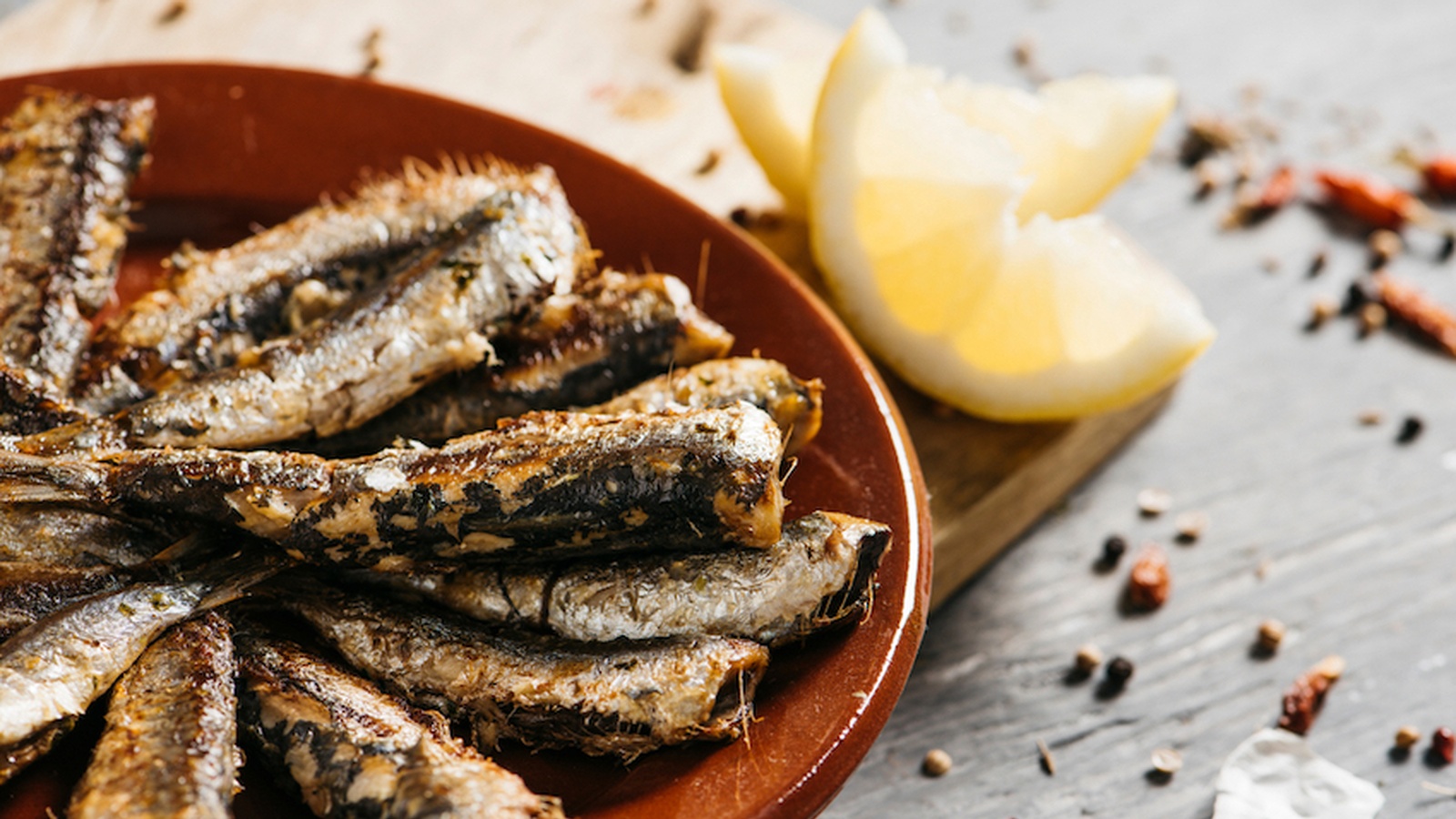9 Health Benefits of Sardines
The tiniest foods can sometimes be nature’s most nutrient-dense. Think about goji berries, chia seeds, and yes, even sardines. Before you go ahead and peel those little fish out of your salad, discover a few impressive sardines nutrition benefits from functional medicine pro, Dr. Josh Axe.
Sardines are jam-packed with important nutrients, securing them a top spot as one of the most nutrient-dense foods on the planet. High in omega-3 fatty acids, protein, vitamin B12 and selenium, sardines in a can are one of the few ingredients on the market that are super healthy, budget-friendly, convenient and delicious.
So why are sardines good for you? Sardines health benefits range from reduced levels of inflammation to enhanced bone health and increased weight loss. Plus, they supply a wide array of important vitamins and minerals for a low amount of calories and can be a versatile addition to a nutritious diet.
All About Sardines
The sardine — sometimes also referred to as the pilchard or herring fish — is a type of small, oily fish that belongs to the Clupeidae family. This fish can be found in many different regions, including the Pacific and Mediterranean, and typically feed on plankton.
Sardines as food are tasty and bursting with important nutrients, making them a worthy addition to any diet. Not only are they rich in omega-3 fatty acids, but they’re also loaded with protein and essential nutrients like vitamin B12 and selenium. Plus, they’ve been associated with a number of health benefits, ranging from better bone health to increased weight loss and beyond.
Although these delicious fish can be purchased fresh, they are most often consumed canned for a convenient and power-packed meal or snack. They also have a distinct signature flavor that works well in many different dishes and recipes, such as salads and pastas.
Sardine Nutritional Facts
The sardines nutrition profile is high in protein and heart-healthy fats as well as important micronutrients like vitamin B12, selenium and phosphorus. One 3.75-ounce can (about 92 grams) of Atlantic sardines contains approximately:
9 Health Benefits of Sardines
In addition to the nutrients listed above, sardines also contain some manganese, thiamine, pantothenic acid and folate.
1. HIGH IN ANTI-INFLAMMATORY OMEGA-3 FATTY ACIDS
Sardines are one of the best natural sources of essential omega-3 fatty acids in the world, with a single 3.75-ounce can supplying over 1,300 milligrams. Sardines provide both EPA and DHA, two types of essential fatty acids that the body uses to reduce inflammation, resulting in improved hearth health, better brain function and a lower risk of chronic disease.
Because of their anti-inflammatory properties, omega-3 fatty acids can be effective in the treatment and prevention of hundreds of medical conditions. Studies show that consuming foods like sardines that are rich in omega-3 fatty acids can help protect against mood disorders like depression and anxiety and aid in the prevention of ADHD, various types of cancer, arthritis, infertility and especially heart disease. In fact, omega-3 fatty acids have also been shown to lower unhealthy cholesterol levels and triglycerides, making them one of the most important nutrients when it comes to maintaining a healthy heart.
Omega-3 fats come in three forms: DHA, EPA and ALA. ALA is found in plant foods including walnuts, flaxseeds, chia seeds and hemp seeds, for example. EPA and DHA are found in fatty fish, including sardines, salmon and mackerel fish. EPA and DHA have been shown to be the most beneficial and easily absorbed by the body, which makes sardines an even more beneficial option for obtaining these specific kinds of fatty acids.
2. RICH IN ESSENTIAL NUTRIENTS
Sardines are rich in many essential nutrients, including vitamin B12, vitamin D, calcium and selenium. They are also a great source of phosphatidylserine and numerous other B vitamins, phosphorus, iron, copper, potassium, and more. Not only do these nutrients play a central role in everything from heart health to metabolism and cellular function, but they can also prevent nutritional deficiencies and help you feel your absolute best.
3. CONTAINS VITAMIN B12
Vitamin B12 is an important water-soluble vitamin that helps maintain nerve function, brain health, blood cell formation, energy levels and more. Unfortunately, many people’s diets are lacking in this key vitamin, resulting in a vitamin B12 deficiency. Even a mild vitamin B12 deficiency can cause symptoms including nerve damage, impaired mental function, difficulty supplying cells with oxygen and chronic fatigue. Fortunately, just one can of sardines goes above and beyond your daily vitamin B12 needs, providing 137 percent of the amount that you need in a day.
4. HIGH IN SELENIUM
Sardines also provide high levels of selenium, containing nearly 70 percent of your daily needs in just one can. Selenium is an essential mineral that also acts as an important antioxidant and is required for your body to create and convert glutathione, a compound dubbed by researchers as the “master antioxidant.”
Selenium prevents oxidative damage in the body, fights off disease-causing free radicals, helps regulate metabolism and improves cellular function. Selenium is also an important mineral for supporting detoxification since it has the ability to take stress off the digestive and endocrine organs like the liver and thyroid. A deficiency in selenium has been linked to thyroid impairment, decreased immune function, hormonal imbalances, reproductive problems, mood disorders and heart disease.
5. PROTECT BONE HEALTH
Sardines are a great source of many vitamins and minerals that are essential for maintaining a healthy skeletal structure, including calcium, vitamin D and phosphorus. Consuming foods rich in calcium can prevent bone mineral loss and help to heal broken bones following injuries. These three key minerals help regulate bone metabolism, a process in which mature bone tissue is removed to allow for the formation of new bone tissue. Sardines are one of the few food sources of vitamin D and one of the rare ingredients that provides a hearty dose of all three, making them an excellent addition to a healthy bone-building diet.
6. DEFEND AGAINST MOOD DISORDERS
Thanks to their high content of omega-3 fatty acids, some research suggests that foods like sardines could be beneficial in the prevention of mood disorders, such as anxiety and depression. Many recent studies have focused on omega-3s’ impact on mental health, particularly EPA, and have found that these essential fats can play a vital role in boosting mood and maintaining healthy brain function to help you beat depression. The brain itself is made up of roughly 60 percent fat, so obtaining the right ratio of fatty acids is crucial for the function of the central nervous system and your overall mood.
7. CONTROL BLOOD SUGAR LEVELS
Sardines are packed with both healthy fats and protein, which both work to slow down the absorption of sugar in the bloodstream. Combining high-protein and high-fat foods like sardines with carbohydrates can slow the release of glucose (sugar) into the blood, helping prevent spikes and crashes in blood sugar levels. Consuming foods with essential fats and proteins is especially important for people who have diabetes, metabolic syndrome or other conditions related to insulin resistance.
In one study conducted on rats fed a high-fructose, researchers fed the rats either casein, sardine protein with high-fructose or sardine protein without high-fructose. Ultimately, they found that “the [sardine protein] diet prevented and reversed insulin resistance and oxidative stress, and may have benefits in patients with metabolic syndrome.”
8. PROMOTE WEIGHT LOSS
Sardines are high in both protein and healthy fats, making them one of the healthiest fish to include in your diet to help you feel full and curb cravings. Considering all of their health benefits, sardines are low in calories but high in essential nutrients that many people are often lacking, including omega-3 fatty acids and vitamin D. They are a great source of low-calorie protein for people looking to cut calories and lose weight.
Numerous studies have also shown that adding fish like sardines to your diet can help you lose weight fast. For instance, one study out of the University of Iceland published in the International Journal of Obesity found that adding seafood to a weight loss diet helped people lose 2.2 pounds more than a control group over a four-week period.
9. LOW IN MERCURY AND POLLUTANTS
One of the best reasons to regularly consume sardines in place of other fish is because of their sustainability and low levels of contamination. Sardines are considered a fish at the bottom of the aquatic food chain because they eat plankton, which means they don’t carry the same toxins and heavy metals as many other fish you should never eat like red snapper, tilefish and swordfish. Avoiding pollutants, including heavy metals like mercury, is one of the biggest concerns for many people today, so purchasing sardines is a good way to get the important omega-3s from fish without compromising on keeping toxins out of your diet.
Sardines in Ayurveda + Traditional Chinese Medicine
With the extensive health benefits and long list of nutrients packed into each serving, it’s no wonder that sardines work well when paired with many forms of holistic medicine, including Ayurveda and Traditional Chinese Medicine.
Fish like sardines can be included as part of a healthy Ayurvedic diet, although it’s recommended to keep intake in moderation, limit fish consumption to lunch only and minimize intake during the autumn season. According to Ayurveda, certain types of fish like the sardine are thought to enhance strength and immunity, nourish the body, and act as an aphrodisiac.
In Traditional Chinese Medicine, sardines are believed to promote kidney health and fight adrenal fatigue. They are also said to enhance fertility and are thought to have cooling properties that can reduce symptoms of excess heat, such as high blood pressure, thirst and constipation.
Where to Find and How to Eat Sardines
Sardines can be eaten fresh and broiled, roasted or grilled, but most often people buy sardines canned, which are widely available in most grocery stores. Sardines are often canned immediately after being caught because they are known to be very perishable.
It’s important to note that there is a big difference in terms of nutrients between freshly caught wild fish and farmed fish. You always want to purchase and eat wild fish and avoid farm-raised fish whenever you can, as farms often produce fish using antibiotics and pesticides and are fed an unnatural diet of grains.
This results in farmed fish having less nutrients than wild fish as well as more toxins and contaminants. Farmed fish are also higher in calories and contain more omega-6 fatty acids, which can create a dangerous inflammation-causing imbalance between levels of omega-3 and omega-6 fatty acids within the body.
The best-canned sardines are those that have been packed in olive oil or water as opposed to soybean oil or other types of refined oils. Sardines tend to last for a decent amount of time once canned, but it’s still best to always check the date to make sure they have not expired and lost their nutrients.
Store canned sardines in a cool and dry place, like your kitchen cabinet, and try consuming them within a few months. If you are able to find and purchase fresh sardines, you’ll want to look for small fish with a fresh smell that still remains shiny and firm. Always use fresh sardines with a few days of purchasing them, since they are considered a very perishable fish. You can store them on ice in the refrigerator for several days.
Sardines are naturally oily, contain small bones and have somewhat of a strong fishy taste. They are also usually very salty-tasting because they are preserved in salt before being canned. While many people love this briny from-the-sea taste, some people don’t. For this reason, many people usually prefer to mask the taste or pair them with other foods that complement their unique flavor.
There are plenty of sardines recipes available online, but a few popular methods for toning down the fishy taste of sardines is to soak them in buttermilk or yogurt, pickle them, grill them, or use them in combination with strong-flavored ingredients. Sardines are complemented by rich flavors like goat cheese, eggs, and fresh herbs. You can also try using sardines on salads, blended into sauces and salad dressings, on top of pizza, or mixed into an egg scramble. Alternatively, if you enjoy a recipe made using anchovies or another type of fish, try subbing in sardines instead.
A Note On Sustainability
Although sardines are generally considered safe for most people to consume, the biggest concerns about sardines for the general population stem back to the question of sustainability, heavy metal contamination, and whether or not consuming canned sardines is a health risk.
Experts believe that sardines nutrition benefits outweigh the possible health risks associated with eating them. However, like with all canned foods, it’s best to try and find a brand that packages its food in a can free of the chemical BPA. BPA is a chemical that is commonly used in the manufacturing of some vinyl, aluminum and tin can liners. This includes some cans that are used to pack sardines and other fish like salmon or anchovies. BPA is known as an “endocrine disruptor” because it may have the ability to disrupt certain hormonal activities in the body and negatively impact the endocrine system.
There is still more research needed on the amount of BPA that is actually able to leach into oily fish when they are packed in BPA cans, as the only research that has been done so far is minimal and has not drawn conclusive results. In the meantime, though, opt for cans that are labeled BPA-free whenever possible.
In order to practice sustainability, it’s also best to look for sardines that are wild-caught from Pacific seas. If possible, try to avoid Mediterranean-caught sardines, as these tend to be the oceans that are quickly becoming the most depleted.
Pregnant women are advised to avoid consuming fish that contain high levels of mercury. Consuming mercury during pregnancy has been associated with risks for developmental delays and brain damage to the fetus. Both experts warn pregnant women to avoid fish including shark, swordfish, king mackerel and tilefish because they are high in mercury. However, sardines are one of the lowest sources of mercury and therefore are normally safe to eat during pregnancy in moderate amounts (one to two times per week) as part of an otherwise healthy diet.
Do you have a passion for nutrition & natural healing?. Learn more about the Food Matters Nutrition Certification Program here.










